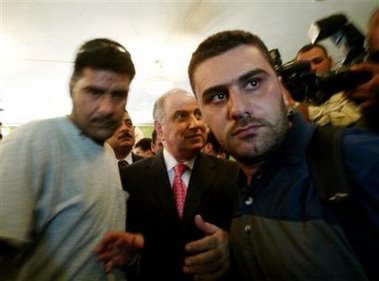Ahmed Chalabi to meet Cheney

November 7th, 2005
Washington D.C.—Ahmed Chalabi, deputy prime minister of Iraq and once a U.S. favorite to replace Saddam Hussein, has not lost his luster with Vice-President Dick Cheney. Mr. Chalabi will hold a private meeting with Vice-President Cheney during his visit to Washington D.C. this week, the first such trip in more than two years
Though not on his official schedule, Mr. Chalabi is counting on meeting his biggest backer in the Bush administration, Vice-President Dick Cheney. Among other heavy hitters, Mr. Chalabi is also scheduled to meet with Secretary of State Condoleezza Rice.
Mr. Chalabi will arrive in Washington D.C. late Tuesday, November 8th, on a British Airways Flight from London. He will stay at the Ritz-Carleton Hotel in the Georgetown section of Washington D.C., where he has booked no less than eight hotel suites for himself and staff.
Though he has been accused in the past by Washington officials of giving Iran classified intelligence before Saddam Hussein was toppled, Mr. Chalabi has been telling Vice-President Cheney’s aides that he is the only Iraqi leader who can control the Iranians. Chalabi’s message is short and simple: support me or Iran will become a greater adversary than you could ever have imagined.
Chalabi’s camp is likely to receive a few surprises during his visit to Washington D.C. Anti-war demonstrators will likely greet him at his hotel and other destinations during his visit, such as the headquarters of the American Enterprise Institute, where he speaks at noon on Wednesday. Other anti-war groups like Military Families Speak Out, Iraqi Vets Against The War and Goldstar Mothers, may have their representatives confront Mr. Chalabi as well.
Legal analysts are studying the proposition of serving Mr. Chalabi with legal documents involving him in “wrongful death claims” associated with American soldiers who have lost their lives in Iraq.
Meanwhile, anti-war Members of Congress are planning to send a letter to Mr. Chalabi demanding a meeting with him to discuss pre-war intelligence. “They want to talk to Mr. Chalabi because he deliberately provided false information to the U.S. government regarding a series of intelligence issues,” according to one congressional aide
Link Here
Top secret: Few signs of progress into Chalabi leak of intelligence to Iran
As Iraqi Deputy Prime Minister Ahmad Chalabi arrives this week in Washington for talks, there is little sign of progress in a federal investigation of allegations that he once leaked U.S. intelligence secrets to Iran, the (paid-restricted) Wall Street Journal reports Monday. Excerpts.
More than 17 months after then-National Security Adviser Condoleezza Rice publicly promised a full criminal inquiry, the Federal Bureau of Investigation hasn't interviewed Mr. Chalabi himself or many current and former U.S. government officials thought likely to have information related to the matter, according to lawyers for several of these individuals and others close to the case.
The investigation of Mr. Chalabi, who had been a confidant of senior Defense Department officials before the war in Iraq, remains in the hands of the FBI, with little active interest from local federal prosecutors or the Justice Department, these people said. There also has been no grand-jury involvement in the case.
The investigation centers on allegations that one or more U.S. officials in early 2004 leaked intelligence to Mr. Chalabi, including the fact that the U.S. had broken a crucial Iranian code, and that Mr. Chalabi in turn had passed the information to the Baghdad station chief of Iran's Ministry of Intelligence and Security. The assertions about Mr. Chalabi's involvement came after U.S. intelligence agencies intercepted a cable from the station chief back home to Iran, detailing what the chief claimed was a conversation with Mr. Chalabi about the broken code.
Former intelligence officials said such a leak could have caused serious damage to U.S. national security. The broken code had enabled U.S. intelligence agencies to monitor covert cable traffic among Iranian operatives around the world. The encrypted cable traffic was a main source of information on Iranian operations inside Iraq. The leak also threatened U.S. efforts to monitor any Iranian steps to develop nuclear weapons. And there was concern that the disclosure could prompt other countries to upgrade their encryption, making it more difficult for the U.S. to spy on them.
Link Here




0 Comments:
Post a Comment
<< Home